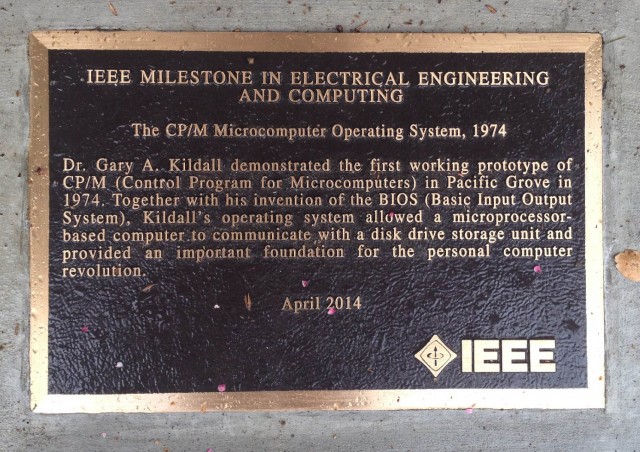Kildall died in 1994, but his adult children, Kristin and Scott Kildall, were on hand for the unveiling.
“Watching everybody gather round and take pictures like it’s a celebrity or something, it shows me how important this is to so many people. It makes me tear up,” Kristin Kildall said at the ceremony. “I feel a real sense of satisfaction.”
Her satisfaction comes from that fact that she feels her father is finally being recognized for his contribution to the personal computer.
For decades, Gary Kildall’s invention has been overshadowed by one business decision he made back in the early 1980s. The story’s been told, twisted and retold again, but it all comes down to this: When approached by IBM to use his operating system on the first personal computer the company was bringing to market, Kildall didn’t immediately seal the deal, and that left the door open for another Washington state native — Bill Gates, who was pushing another operating system.
IBM eventually signed a contract with both Kildall and Gates, allowing the consumer to pick the OS they wanted. But IBM charged customers $240 for CP/M and just $40 for Gates’ PC DOS.
“That was such a shock,” said Tom Rolander, who also attended the Pacific Grove ceremoney. “I expected IBM to be fair.”
Rolander worked at Digital Research. He was Kildall’s college friend, best man in his wedding and business partner.
Rolander said that price differential marked the end of CP/M, but not Gary Kildall’s business ventures. He went on to start other companies. Rolander says Kildall was not haunted by the end of CPM, but that other people just couldn’t get over it.
“He had to keep going over and over that story and then that story turned from that into ‘Wow! if you’d gotten the IBM contract instead of Bill, you’d be the billionaire, so how do you feel about that?’,” Rolander said..
He said he hopes this IEEE Milestone will change that.
“I don’t believe there’s going to be a bronze plaque anywhere near Microsoft for Bill Gates for a creation of a technology. I think this is something that Gary truly invented and did, and so I think it’s the legacy for Gary and it’s the appropriate one,” Rolander said.
Kristin Kildall has even broader hopes for how her father will be remembered.
“I think we often have this idea of making money at any cost is valid and worthwhile, but he really taught me how important it is to be a good human on top of that,” she said. “Somebody who can be a great innovator and a success, and still be a great person, personally, and somebody people can love personally, aside from that. I think that’s something that’s really rare. I think that’s something we can all strive to be.”
The Milestone plaque is embedded in the sidewalk at 801 Lighthouse Ave. in Pacific Grove. Kristin Kildall likes the permanence of it all. Her father’s legacy may fade from memory, but this Milestone is forever.

